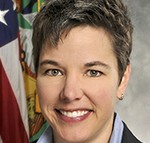The Treasury Department revealed its final rules geared to stop the illicit flow of money through residential real estate.
The agency’s Financial Crimes Enforcement Network seeks to close loopholes used by criminals to launder money through all-cash property transactions. The rules are set to go into effect in 2025.
The rules provide some finality to FinCEN’s previous attempts to combat money laundering in residential real estate through geographic targeting orders, or GTOs.
Those orders, first implemented in 2016, require title insurance firms to file reports identifying owners in all cash transactions for certain jurisdictions and thresholds. The orders sent shockwaves through the market in places like Miami where cash transactions for homes were common.
But critics said GTOs had massive loopholes. For one, criminals could simply buy real estate in places where the GTOs were not in effect. In another workaround, money launderers could buy property at prices below the threshold.
The Treasury Department’s new rule attempts to prevent such evasion. The rules will apply nationwide and to any purchase, regardless of price.
The agency also finalized anti-laundering rules pertaining to investment advisers, who will be required to file suspicious activity reports.
Gary Kalman, executive Director of Transparency International U.S., a global coalition fighting corruption, said the rules are “a big deal” in ensuring that the U.S. is no longer an easy place to launder money.
“FinCEN did a good job at looking ahead at how clever lawyers might draft mechanisms for evading reporting,” Kalman said.
Under the GTOs, title insurers were responsible for reporting information about residential sales to FinCEN. But the new rules allow other real estate professionals to report information. FinCEN created a “cascade” system to establish which professionals have reporting responsibilities.
The agency said these responsibilities will generally fall to settlement agents, title insurance agents, escrow agents and attorneys, but only one person will need to file a report for each transaction. Real estate agents and appraisers are exempt.
FinCEN rules only focus on all-cash, residential real estate transactions. Deals involving mortgages are not required to report this information.
Read more



Commercial real estate transactions are also not included, which raises the possibility that money launderers will use them more often to avoid detection. Kalman said his organization is pushing for new reporting rules for commercial real estate.
“The commercial sector accounts for more than 30 percent of all real estate money laundering cases and we encourage Treasury to continue to move forward as promised and release rules to address those risks as soon as possible,” said Kalman in a statement.
